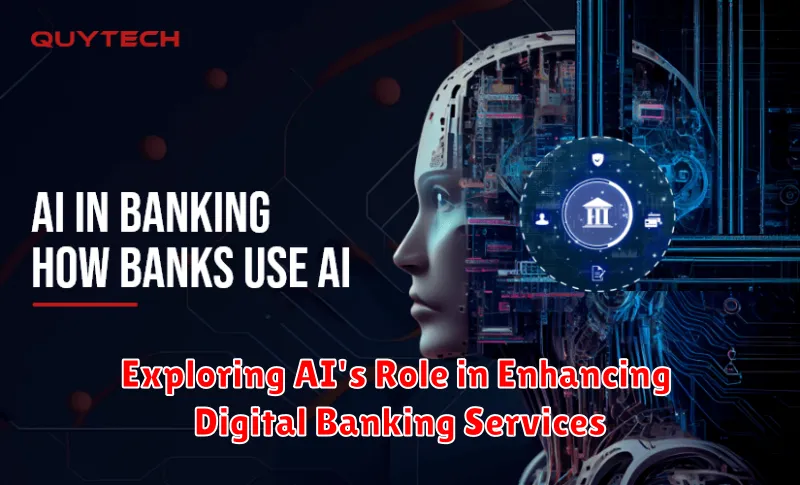The landscape of digital banking is rapidly evolving, driven by relentless innovation and increasing customer expectations. Artificial intelligence (AI) is emerging as a transformative force, poised to revolutionize how banks operate and interact with their customers. This article explores the profound impact of AI in digital banking, examining its potential to enhance efficiency, personalize services, and fortify security measures. From AI-powered chatbots providing instant customer support to sophisticated algorithms detecting fraudulent activities, the integration of AI is reshaping the future of digital banking services. Understanding the capabilities and implications of AI is crucial for both financial institutions and consumers navigating this new era of intelligent banking.
AI in banking is not merely a technological advancement; it represents a fundamental shift in the financial services paradigm. By leveraging AI’s analytical prowess and automation capabilities, banks can optimize their operations, reduce costs, and deliver hyper-personalized experiences to their customers. This exploration delves into the various applications of AI across digital banking services, including personalized financial advice, fraud detection, risk management, and regulatory compliance. The increasing adoption of AI in digital banking promises to create a more efficient, secure, and customer-centric banking ecosystem.
What is Artificial Intelligence in Banking?
Artificial intelligence (AI) in banking refers to the application of machine learning and other AI techniques to automate and enhance various banking operations and services. It involves using intelligent systems capable of analyzing vast amounts of data, identifying patterns, and making decisions or predictions with minimal human intervention.
These AI-powered systems are transforming the banking landscape by enabling personalized customer experiences, streamlining processes, and mitigating risks. From chatbots providing instant customer support to algorithms detecting fraudulent transactions, AI is playing a crucial role in shaping the future of digital banking.
AI in banking encompasses several key areas including fraud detection, risk management, customer service, and personalized financial advice. Its adoption aims to improve efficiency, reduce costs, and enhance the overall banking experience for both customers and institutions.
AI for Fraud Detection and Security
Artificial intelligence (AI) plays a crucial role in enhancing security and mitigating fraud within digital banking. Real-time fraud detection leverages AI algorithms to analyze vast amounts of transactional data, identifying suspicious patterns and anomalies that may indicate fraudulent activity. This allows financial institutions to respond swiftly, preventing losses and protecting customer accounts.
AI can identify subtle indicators of fraud that traditional rule-based systems might miss. By analyzing factors like transaction location, time, amount, and device information, AI models can flag potentially fraudulent transactions for further review or immediate blocking. This proactive approach significantly strengthens the security posture of digital banking platforms.
Beyond transaction monitoring, AI contributes to overall security enhancements. Behavioral biometrics, powered by AI, analyzes customer interaction patterns, such as typing speed and mouse movements, to verify user identity and detect unauthorized access attempts. This adds another layer of security, bolstering customer trust and confidence in digital banking services.
Personalized Financial Advice

Artificial intelligence is poised to revolutionize how banks offer financial advice. By analyzing individual customer data, AI can provide personalized recommendations for budgeting, saving, and investing.
Traditional financial advising often relies on generalized rules and may not cater to specific individual needs. AI algorithms, however, can consider factors like spending habits, income, and financial goals to offer tailored insights. This allows for more effective financial planning and can help customers achieve their financial objectives more efficiently.
Furthermore, AI-powered tools can offer proactive alerts, such as notifying a customer of potential overdraft fees or suggesting adjustments to their investment portfolio based on market fluctuations. This level of personalized attention enhances the customer experience and promotes greater financial well-being.
Improving Customer Support with AI
Artificial intelligence is transforming customer support in digital banking. AI-powered chatbots offer 24/7 availability, addressing common inquiries and resolving simple issues immediately. This frees up human agents to handle more complex requests, leading to increased efficiency.
Beyond chatbots, AI contributes to improved customer experiences through personalized support. By analyzing customer data, AI can anticipate needs and offer proactive solutions. This can include personalized financial advice or tailored product recommendations.
Furthermore, AI can analyze customer interactions to identify areas for improvement in service delivery. This data-driven approach allows banks to optimize support processes and enhance overall customer satisfaction.
Automated Investment Management
Automated investment management, often referred to as robo-advisors, leverages AI algorithms to manage and optimize investment portfolios. These platforms offer personalized investment strategies based on individual risk tolerance, financial goals, and market conditions.
By automating tasks such as portfolio rebalancing, tax-loss harvesting, and security selection, robo-advisors provide a cost-effective and accessible entry point to investment management for a broader range of customers.
AI’s analytical capabilities enable these platforms to identify trends, assess risk, and adjust portfolios more efficiently than traditional methods, potentially leading to improved returns and reduced management fees. This accessibility empowers individuals to participate in the financial markets and build wealth through intelligent automation.
Predictive Analytics for Finance
Predictive analytics plays a critical role in modern finance, leveraging the power of data to forecast future trends and behaviors. Within digital banking, these techniques offer significant advantages.
Key applications include credit risk assessment, where algorithms analyze customer data to predict the likelihood of loan defaults. This allows institutions to make more informed lending decisions and manage risk effectively.
Furthermore, predictive analytics can optimize fraud detection. By identifying patterns and anomalies in transaction data, banks can proactively flag and prevent fraudulent activities, safeguarding customer accounts and minimizing financial losses.
Enhanced User Experience
Artificial intelligence plays a crucial role in elevating the user experience within digital banking. Personalization is a key aspect of this enhancement. AI algorithms analyze user data to tailor services and offers, creating a more relevant and engaging experience.
Chatbots powered by AI provide instant customer support, answering questions and resolving issues promptly. This 24/7 availability significantly improves accessibility and convenience for users.
AI also streamlines processes, reducing the time required for tasks such as account opening and loan applications. This simplified and efficient interaction contributes to a more positive overall user experience.
Regulatory and Ethical Considerations
The integration of AI in digital banking necessitates careful consideration of regulatory and ethical implications. Data privacy and security are paramount. Financial institutions must ensure compliance with regulations like GDPR and CCPA, safeguarding sensitive customer information from unauthorized access and breaches.
Algorithmic bias presents another significant challenge. AI models trained on biased data can perpetuate and amplify existing societal inequalities. Banks must implement rigorous testing and monitoring processes to identify and mitigate bias, ensuring fair and equitable outcomes for all customers.
Transparency and explainability are crucial for building trust. Customers deserve to understand how AI-driven decisions are made, particularly those impacting their financial well-being. Regulatory frameworks are evolving to address these concerns, emphasizing the need for explainable AI (XAI) in financial services.
Future Innovations with AI
Artificial intelligence promises to revolutionize digital banking even further. Predictive analytics will enable highly personalized financial advice and proactive fraud detection. Imagine AI tailoring investment strategies based on individual risk tolerance and market fluctuations.
Hyper-personalization extends beyond finance management. AI-powered chatbots will evolve, offering seamless customer service and resolving complex inquiries with human-like understanding. This will lead to 24/7 availability and personalized support.
AI-driven security measures will enhance fraud prevention by identifying suspicious activities in real-time. Biometric authentication and behavioral analysis will strengthen account security, minimizing risks for both customers and institutions.
Understanding AI’s Limitations

While AI offers significant potential, it’s crucial to acknowledge its limitations within the digital banking landscape. Data dependency is a primary constraint. AI algorithms require vast amounts of data to function effectively, and biases present in this data can be perpetuated and amplified by the AI.
Lack of generalizability is another key limitation. An AI model trained for a specific task may not perform well on a slightly different one, requiring retraining and adaptation. Furthermore, explainability and transparency remain a challenge. Understanding how complex AI models arrive at their decisions can be difficult, posing challenges for regulatory compliance and trust-building with customers.
Finally, AI’s susceptibility to adversarial attacks is a growing concern. Malicious actors can exploit vulnerabilities in AI systems to manipulate outcomes, emphasizing the need for robust security measures.

